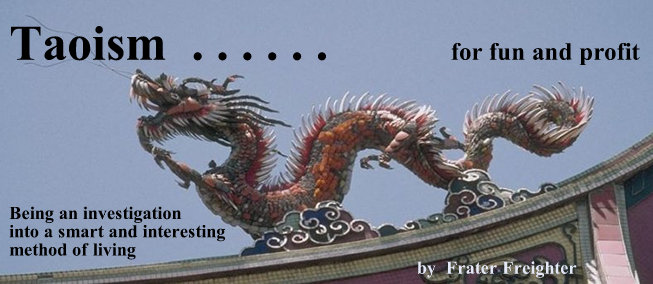
© 1994 The Midnight Bathing Association, East Asian Studies Department, Frater Bai Ruifu presiding, & © 2001 Winged Feet Limited
| Frater Freighter (name changed to protect the guilty) spent a year in China as part of a degree in Modern Chinese Studies. Since then he has been able to put the knowledge gained to truly great use, as one of the few English people at the time to have worked in telesales in Britain selling to China. Apart from that, his stories are a damn sight more interesting than the sort of thing one normally hears in the pub. |
CHINA HAS embraced all the world's major religions, such as Islam, Buddhism and Christianity, but confusion arises over its native religions: are they religion or philosophy? Confucianism is mostly seen as philosophy, folk religion as superstition and Taoism as a mystical religion and philosophy. In the People's Republic, Taoism is the only one recognised as a religion, and although native to China, was the one most harshly repressed by the communists.
|
origins |
Taoism's origins are obscure, and many of its practices go back to the shamanic traditions of China, but 'formal' Taoism started with a book called the Dao De Jing (The classic of the Way and Virtue), or the Lao Zi, after its author. This book was written around 500-470 BCE, during the Warring States period, a time of great upheaval in China. Later Taoist sages wrote other books on Taoism, such as Zhuang Zi and Lie Zi, as well as treatise on alchemy and meditation but the Dao De Jing was the first and is still the most famous.
The traditional
author of the Dao De Jing, Lao Zi (meaning 'old master'), was said to
be a man called Li Er, the keeper of the imperial archives for the Western Zhou
dynasty. He was visited by Confucius, who discussed many things with Li Er and
later said "I know birds can fly, fish can swim, animals can run, but the dragon,
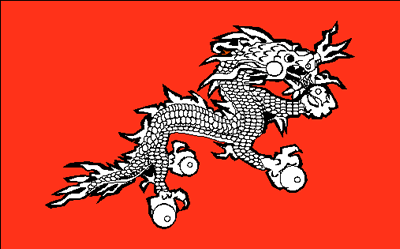 soaring
in the clouds and in the sky, is inscrutable and beyond our reach. Li Er is
just like a dragon!"
soaring
in the clouds and in the sky, is inscrutable and beyond our reach. Li Er is
just like a dragon!"
Lin Yinxi, keeper of the Han Gu pass, met him as Lao Zi passed west to into seclusion, never to be seen again. Lin was greatly impressed by Taoism and asked him to write down the essence of his wisdom. Lao Zi complied and the two books, Dao and De together are what we know as the Dao De Jing.
The book is extremely short consisting
of about 5,000 words in 81 chapters, each of which is more like poetry or a
Zen Koan (riddle) than prose. It deals with how to live and how to rule
in accordance with the Dao (way) and the De (virtue or power),
using the method of Wu Wei (inaction).
The book is extremely
short consisting of about 5,000 words in 81 chapters, each of which is more
like poetry or a Zen Koan (riddle) than prose. It deals with how to live
and how to rule in accordance with the Dao (way) and the De (virtue
or power), using the method of Wu Wei (inaction).
|
style
|
The style
of the book and the mechanics of the Chinese language are such, that English
translations do not convey all the possible meanings. The character for Dao
currently has 13 meanings, not all of which were in use when the Dao De Jing
was written, and the Dao of Confucians is different to the Dao
of Taoists. 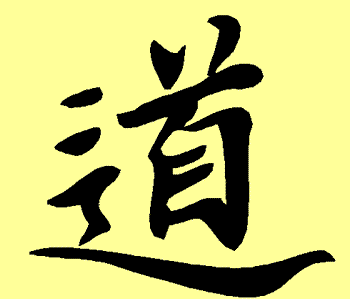 Most
scholars translate it as 'to speak' as well as 'the way' in the first line of
the Dao De Jing: as Alan Watts points out, literally it is "Dao can be
Dao not eternal [or regular] Dao"(l).
Thus, translating the Chinese is a case of informed (or uninformed) guesswork,
and the final result is very much the work of the translator as well as of Lao
Zi.
Most
scholars translate it as 'to speak' as well as 'the way' in the first line of
the Dao De Jing: as Alan Watts points out, literally it is "Dao can be
Dao not eternal [or regular] Dao"(l).
Thus, translating the Chinese is a case of informed (or uninformed) guesswork,
and the final result is very much the work of the translator as well as of Lao
Zi.
I am not suggesting that you should go and learn classical Chinese and only read the original (I haven't): most English translations are excellent (which is good and which is bad is a matter of choice for the reader), but don't accept any one as the whole truth.
The slightly later book called Zhuang Zi is in prose, and is less inscrutable than Lao Zi's poems. Much of the wisdom in this work is contained in parables and stories, and I heartily recommend it as an excellent introduction into Taoism, without the hard work needed to understand the Dao De Jing.
Unlike many other
philosophers, the Taoist sages, particularly in the Zhuang Zi, had a
somewhat impish sense of humour at times, and an interest in the bizarre, the
nasty and the ugly (Chaos Magicians take note!). This is not only a part of
the charm of their books, but also serves as a valuable method of teaching,
much like the clown antics of the Sufis. Their attitude to death, for example,
no doubt seemed shocking and perhaps subversive to Confucians: death was neither
good nor bad - it was zi ran, or natural, and therefore it was not to
be lamented. This was in great contrast to the Confucian rites, where up to
four years' mourning was deemed essential.
|
individuals
|
The Taoists were also against interfering government, which seeks to generalise, and impose a standard set of morals on to individuals. They viewed this as attempting to create 'sameness' out of totally different viewpoints and individuals, and thus saw it as highly undesirable and impractical. This maverick attitude is one reason why they led several popular revolts in China, and were often persecuted as dangerous anarchists by the government.
In both the Zhuang Zi and the Lao Zi, there are hints of magic and immortality. In chapter 19 of the Zhuang Zi, Lie Zi says to Yin: "The perfect man can walk under water without choking, can tread on fire without being burned, and can travel above the Ten Thousand Things without being frightened. May I ask how he manages it?" Yin replies: "This is because he guards the pure breath (Qi) - it has nothing to do with wisdom, skill, determination or courage."
Taoist alchemy, as well as Tai Ji Quan and Qi Gong, were based on hints such as these, as was Taoist magic. Alchemy was aimed at achieving immortality, as it was in the West, and both systems were also a coded form of sexual yoga and magic. It was also from these hints that the folk or religious Taoism gained its roots, combining earlier magical and shamanic techniques with Taoism, and adding to the texts of Taoism a mythology and a pantheon. Folk Taoism included elements of animism, such as spirits inhabiting certain places, as well as exorcism, divination, geomancy (feng shui), martial arts and magic, linking it to shamanism.
So, Taoism contains elements of magic, mysticism, philosophy and cosmology. What does it have to say about the world and the way it works? What is meant by the terms Dao, De and Wu Wei? What is its practical value? These are questions that I hope to answer.
Concepts & Confusion
The central concept in Taoism is the Dao, which is usually translated as 'the way'. The first chapter of the Dao De Jing explains that the Dao is ineffable: "The Way that can be told of is not an Unvarying Way;"(2). We immediately encounter a problem with definition: the key concept is by its nature indefinable and inconceivable. Due to this, the Taoists were against learning and books: no formal teaching could transmit the Dao and everything was trivial compared to the Dao. Language is just metaphor and inadequate to explain Dao. If one says it is X, this precludes it being Y, and this is to misunderstand the Dao, which encompasses everything. (It is both X and Y, neither X nor Y, X but not Y, Y but not X, all of the above, and none of the above.) Knowledge is another obstacle to understanding the Dao, because it serves to classify things, and give an overview, but you cannot classify the unclassifiable.
Dao is impossible to define, but a working definition is needed to give some hints to its full meaning:
First, Dao is the organising principle behind the universe; the 'order' behind the apparent randomness of creation, the rules of the game. In this aspect it could be likened to a fractal equation for the universe, where a simple equation can give birth to extremely complex forms. In chapter 51 of the Lao Zi, it says of the 'ten thousand things':
"Dao
gave them birth;
The 'power' of Dao reared them,
Shaped them according to their kinds,
Perfected them giving to each its strength."
Secondly, Dao can be seen as 'Etic Reality' as opposed to 'Emic Reality', that is to say objective rather than subjective reality. This is supported by the first line of the Dao De Jing, "The Way that can be told of is not the eternal way," in that Etic Reality cannot be described by metaphors such as language without immediately becoming Emic Reality.
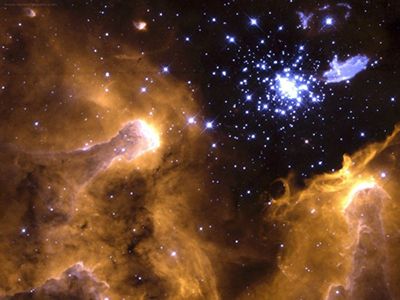
|
|
The Universe earlier today
|
A similar theory is that of Dr. David Bohm, a quantum physicist, who says that there are two universes: the 'Implicate Order' and the 'Explicate Order'. The 'Explicate Order' is the universe we can perceive, which is pinpointable in space-time. The 'Implicate Order' cannot be perceived, except by observing it in the form of its results. It is also 'non-local', in that it permeates four dimensional space-time, but no part of it has location: it exists not just at one point in space or time but at any and every point (3). In this context, Aleister Crowley said that the Dao was "The result of subtracting the universe from itself."(4)
The Lao Zi
advises that there is no difference between the opposites of human thought,
such as beauty and ugliness, they are merely different aspects of the same principle.
The Zhuang Zi illustrates that there is often a greater usefulness in
being considered useless or ugly, and highlights the relativity of such terms
(what is good for one person may be bad for another). He also shows that Dao
is in everything, high or low, good or bad, beautiful or ugly, emperor or excrement.
This is said as an illustration of the omnipresence of Dao (whilst no doubt
scandalising Confucians, who revered the higher and finer things), and imploring
the sage to treat everything as the same: a sacred manifestation of Dao.
|
harmony
|
Thirdly Dao is a principle that, if followed, can transform the individual into one who is in harmony with the world and nature, and thereby prolong or preserve life. It also allows the individual to perceive the universe's workings more completely, thus making the task of living easier. The story of Cook Ting, in the Zhuang Zi, illustrates this ease of living through application of the Dao. Vegetarians may care to look away at this point.
Cook Ting was cutting up an ox for Lord Wen-hui. At every touch of his hand, every heave of his shoulder, every move of his feet, every thrust of his knee - Zip! Zoop! He slithered the knife along with a zing, and all was in perfect rhythm, as though he was performing the dance of the mulberry grove or keeping time to the Ching-shou music.
xx "Ah, this is marvellous!" said Lord Wen-hui. "Imagine skill reaching such heights! Cook Ting laid down his knife and replied,
xx "What I care about is the Way, which goes beyond skill. When I first began cutting up oxen, all I could see was the ox itself. After three years I no longer saw the whole ox. And now - now I go at it by spirit and don't look with my eyes. Perception and understanding have come to a stop and spirit moves where it wants. I go along with the natural make-up, strike in the big hollows, guide the knife through the big openings, and follow things as they are. So I never touch the smallest ligament or tendon, much less a main joint.
|
joints
|
xx "A good cook changes his knife once a year - because he cuts. A mediocre cook changes his knife once a month - because he hacks. I've had this knife for nineteen years and I've cut up thousands of oxen with it, and yet the blade is as good as though it had just come from the grindstone. There are spaces between the joints, and the blade of the knife has really no thickness. If you insert what has no thickness into such spaces, then there's plenty of room - more than enough for the blade to play about in. That's why after nineteen years the blade of my knife is still as good as when it first came from the grindstone.
xx "However, whenever I come to a complicated place, I size up the difficulties, tell myself to watch out and be careful, keep my eyes on what I'm doing, work very slowly, and move the knife with the greatest of subtlety, until -flop! The whole thing comes apart like a clod of earth crumbling to the ground. I stand there holding the knife and look all around me, completely satisfied and reluctant to move on, and then I wipe off the knife and put it away."(5)
This concept of the Dao holding the key to having 'the knack of things' is reiterated throughout the Zhuang Zi. This principle of seeing the overall structure, seeing the way of least resistance and then using the least effort for the maximum returns, leads ultimately to the principle of wu wei, which can be translated as 'inaction', 'not doing' or 'not striving'.
This principle has led to great differences in opinion amongst scholars as to its meaning. No scholars seem to feel that it can mean exactly what it says, i.e. inaction.
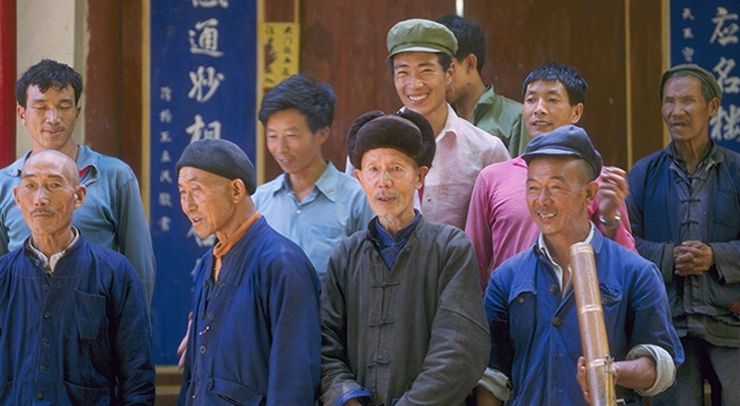
Waley
translates it as "'non-activity', i.e. rule through De ('virtue', 'power')
acquired in trance." This is an extension of Waley's idea that the original
Taoists were Quietists, or meditation enthusiasts. Certainly, in altered states
of consciousness, one may experience a non-spatiotemporal system, outside and
beyond space-time. These experiences may radically change one's attitudes to
life, causing one to act according to this information, by observation, and
thus to alter one's behaviour (perhaps doing things spontaneously and without
conscious thought or purpose).
|
psychedelic
|
Timothy Leary's research into LSD-25 and its effects on recidivism in criminals certainly bears out this hypothesis: criminals who underwent psychedelic experiences were found to have a much lower probability of recidivism (80% did not recommit crimes). The experiment is however under doubt, as are most psychedelic drug experiments that yield positive results, and further legitimate research into this field has been all but stopped by the banning of LSD by all governments in the West.
Isabella Mears, the Theosophist (6), translates wu wei as activity through the 'inner life' or 'spirit in man', which is Waley's answer of using meditation, tinged with the Theosophist ethos. N.J. Girardot feels that wu wei is closely associated with 'forgetting oneself' or "forgetting one's ordinary human face in order to return to the condition of hun dun(7) (primal chaos), which should interest all you Chaos Magicians.
Herrlee Creel agrees with Waley by saying that it represents a withdrawal from human affairs, and contemplation of the universe. However, he distinguishes between 'contemplative' and 'purposive' Taoism, where "a ruler must practice wu wei, i.e., avoid overt activity, and that he can do this by means of various administrative techniques."(8)
Joseph
Needham differs somewhat, saying that wei is action contrary to nature,
or going against the grain, and thus wu wei is not acting contrary to
nature. He backs up this argument by quoting the Huai Nan Zi: "What is
meant, therefore, in my view, by wu wei, is that no personal prejudice
(or private will) interferes with the universal Dao, and that no desires
or obsessions lead the true courses of techniques astray."(9)
|
quietism
|
Burton
Watson refutes Waley's notion of Quietism and translates it as "a course of
action that is not founded upon any purposeful motives of gain or striving."
Holmes Welch however, feels that wu wei is inaction in the sense of avoiding
"all hostile, aggressive action."(10)
He quotes Lao Zi extensively on 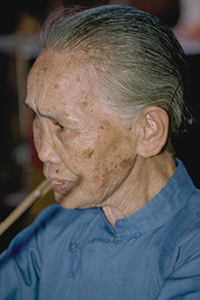 aspects
of yielding and not contending, and on government of people by the Dao.
aspects
of yielding and not contending, and on government of people by the Dao.
An interesting analogy for the concept of inaction as an efficient way of getting things done comes from a Zen koan or riddle: Take a new born goose and slip it through the neck of a bottle. Keep it in there and feed it until it has grown too big to be passed through the neck of the bottle. Without breaking the glass, how does one get the goose out? The answer is to do nothing, and wait until the goose pecks its way out, just as it pecked its way out of its egg when it hatched.(11)
This riddle has interesting parallels to Thelema, the law devised by Aleister Crowley that states "Do what thou wilt shall be the whole of the law". If the 'thou' in this maxim is taken as the universe, it becomes more like: "Do what Dao wilt shall be the whole of the law", and is close to wu wei.
Deciding what wu wei means is, like the Dao, a problem. Needham's argument is certainly plausible, and Watson backs him up to some degree; in view of the Taoists' use of both yoga and meditation to gain knowledge of Dao, and thus enlightenment, Waley's argument also seems true. The Taoists were mystics, and used deliberately ambiguous language, to convey the multifaceted meanings of their writings.
|
spontaneity
|
Thus wu wei can mean all of the above theories. It can mean doing things in accordance with nature and the Dao. It can also mean action through power of the Dao and perceptions of the world gained in trance. It can also have the meaning of not doing things consciously or purposefully, thus adhering to the principle of spontaneity or 'suchness' (it is certainly easier to breathe unconsciously rather than consciously).
The other main principle of Taoism is the De, translated as 'virtue' by most scholars. However, De is translated as both virtue (in the sense of being an inherent characteristic) and power by Waley and Crowley. Looking at Mears we see he describes De as 'truth'; 'principle exemplified in action' or 'manifestation' while Watson describes it as 'virtue' or 'the vital power belonging to a man of Tao'. Curiously, all seem to be in agreement that De is the manifestation of Dao on the physical plane, or the energy derived from it. It could perhaps be better rendered as 'that which is acquired by virtue of Dao'. From the Lao Zi we learn that Dao produces a thing, whilst De maintains it, and that De is what an individual entity receives from Dao. In the language of Dr. Bohm, De represents the results that we can perceive from the non-local implicate order, or Dao.
Practical Taoism: Laboratory Work
Now we have discussed Taoism's history and main concepts, it is time to offer some practical experiments for you to try at home (get an adult to help with the nuclear reactor part).
The first experiment is obtaining a copy of the Zhuang Zi or the Dao De Jing, reading it, then seeing whether you agree with my views. I would recommend the Asiapac Chinese Philosophers in Comics series by Tsai Chih Chung (The Sayings of Lao Zi, The Sayings of Zhuang Zi - these are available from good bookshops and sites like Amazon). These are easy to read, they still contain the depth of the originals and I think Lao Zi and Zhuang Zi would have enjoyed the idea.
The second experiment is to become an observer.
"Here, in the heart of the jungle, we find what is surely the strangest of species..."
This requires detachment from the human species. To aid this I shall refer to them as domesticate primates. There are many ways of becoming detached. Try recording nature documentaries, and then watching them on Sundays as a form of meditation. Observe the pecking orders of the animals, the hierarchies, the group structures, the mating rituals, 'the games'. Then go to work or the pub and try to observe the 'games' and the pecking orders of the domesticated primate there, using the same techniques as David Attenborough.
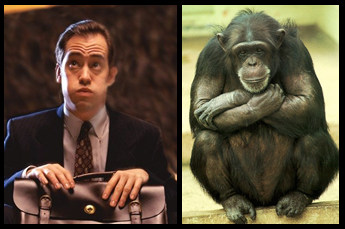 |
Having ascertained some of the rules and your placement in the game, you can begin to improve your play. This does not necessarily involve winning (see the fourth experiment), nor gaining control over people and events. These goals are mostly illusory, and to the Taoist represent a problem: effortless living is not to be found in spending all your time controlling other people's actions, and does not cultivate the Dao in others.
|
comedian
|
If you step back, you can see the fulcrum, and then work out where to push, unnoticed, for the maximum gain for the minimum effort. It's a bit like cheating at cards, but you are at liberty to let anyone you choose win, not just yourself, but even your opponent, if that looks to be the path of least resistance. One can also see one's own place within the game structures and hierarchies, which means you can play your role with more conviction. It is all just a game - win, lose or draw. With this knowledge one becomes a comedian, and can appreciate the comedy of cosmic proportions being played out before you. It is just a game - life is far too important to take seriously.
Detachment is the key to observation of the domesticated primate. Involvement is the key to the application of this knowledge in the games played.
The third experiment is designed to increase the amount of spontaneity in your life, and decrease the illusion of control being desirable.
"I am the diceman, and I take a chance, man, can you lake a chance, honey?..."
Obtain some dice, and begin to make some of your decisions based on chance. If you're anything like me, and spend hours in the video shop trying to decide what video to rent, try deciding by dice:
1-3 video
shop A,
4-6 video shop
B.
1 = Action
film,
2 = Thriller,
3 = Horror/Sci-Fi,
4 = Comedy,
5 = Children's,
6 = Porn.
Then select six videos in the dictated category, some you like, some at random, some you hate, number them, throw the dice and rent the indicated video. Using this method, I've watched some excellent films that I'd never have chosen otherwise and some trash ones too. The proportion of good movies to trash is about the same as through normal choice, but the random process takes five minutes instead of half an hour.
Start looking at your life: what can you control? What can't you control? Try to get less upset about things that you can't control. Losing control is really difficult, but control is mostly an illusion. If you think you're in control of your life, you aren't, but if you know you have no control over what happens to you, your control is greater than that of those who know they're in control. This is because maintaining the illusion of control takes up a lot of time and effort.
Be less surprised or uncomfortable with novelty, and loss of control. Sit back, relax and float downstream - you may have no control, but you can at least enjoy the journey's sights and sounds. You may well be pleasantly surprised at the foreign shores you get washed up upon. Don't forget that most of life's major crises are paradoxically not life-threatening, but just a case of emotions and glands being over active.
The fourth experiment is all about relativity.
"If space and time really are relative, why did they never turn up at my birthday parties?"
Water boils at 100 Celsius, right? Wrong, it boils at 100°C at sea level, if it's pure. This boiling point is untrue at different heights from sea level. This is an anorak-clad physics fact, but it serves to illustrate a Taoist point: what's true for one set of circumstances may not be for others. Try to avoid thinking in terms of truth or reality, because both are relative and rather subjective.
Universal truths, such as those in religions should be avoided. Each of these so-called truths was thought up by a human, one branch of the primates, who belong to the family of mammals, which are themselves, just one type of animal. On our planet, there are millions of types of animals: some fly, some breathe in water, some eat plants, some eat meat, some have skeletons, some don't, some have legs, and some don't. Animals are one of three types of living organism, each animal's way of life is alien to the other. They all exist on one planet out of at least nine in one solar system. The solar system is one of the thousands in our galaxy and our galaxy is one of billions in the universe. Are we still sure of these universal truths?
Whenever you can, try to notice times when you are judging a person or an event. What is good? What is bad? Try to imagine the good that can come from a situation you deem to be bad, and vice versa. A Taoist story serves to illustrate this:
A man whose wife gave birth to a son was congratulated by the whole village, everyone saying how lucky he was. He replied: "It might be good, it might be bad, who's to say?" The villagers thought he was mad not to see how happy the event was. Some years later, the man's son lost his leg in an accident at work. The people of the village came round to offer their condolences to the man, saying how tragic it was. Again the man said: "It might be good, it might be bad, who's to say?" The villagers could not believe he wasn't sure it was a tragedy, and called him a madman. A few years later, there was a war, and all the young men in the village were drafted into the army, except for the man's son because he had no leg. The villagers said nothing, and the man was revered as a sage from then on.
Bombastic Conclusion
Armed only with these experiments and a copy of the Dao De Jing, you may now go out into the world and try being a Taoist, but use the force wisely, Jedi. Live an effortless life, and try not to leave even a ripple.
We are not separate beings, we are all like rivers - the water is different at every moment - it just seems the same river. We do not exist, we flow. We are not particles, we are processes. When you lie in bed, at what point does your skin stop and the bed begin? At an atomic level do we not intermingle? That said, it is important to remember: you are the centre of the only universe you will ever, ever really understand. Any attempt at mingling and becoming another extant person is a romantic illusion. It is, however, a pleasant illusion, and the choice is yours. But don't be fooled - just pull the wool over your own eyes a little. It beats having others pull it over your eyes for you.
That is all, citizen. Thank you for your co-operation.
References xx Home xx More Articles xx Top of Page
|
Copyright © 2001-2006 Winged Feet
Limited
Visitors since Jan 01 2006 |